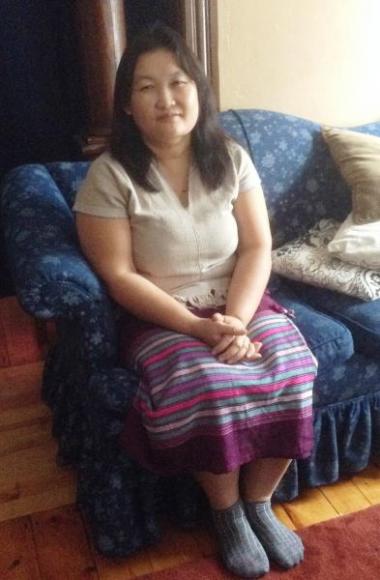
During that time because of the war, there was killing and fighting and we were scared and then we came to the refugee camp. We were so scared of the soldiers, the Burmese soldiers.I had the three children … one can walk and the other two I need to carry. It was a rainy time so it took us like three weeks to get to the camp.
Throughout this interview Dar Ku's quiet courage and resilience shine through. Born in Burma, now called Myanmar, on July 25, 1969, Dar Ku and her family fled their home even as the Burmese soldiers threatened them with death if they tried to escape. Dar Ku recounts running for her life as soldiers terrified everyone fleeing by saying: "If you don't … if you don't come back, we will kill you." Dar Ku and her family made the difficult journey to the Nu Poe Refugee Camp in Thailand, walking all the way with their three young children. She recounts how difficult this journey was by saying "It was the rainy time … so it took three weeks to get to the camp," and at that time only one of her children was old enough to walk so the other two needed to be carried. Her fourth child was born approximately two years later in the refugee camp.
In discussing her flight from Burma it becomes clear how war tears families apart as individuals make varying decisions and scatter to different locations in their attempts to find safety. Dar Ku tells us, "Ah, during that time, no one, I mean …. every, everyone left the village and then the sister, I mean, like my sister and other little brother … sister they went I mean they went to another place and the other went to another place and then … I mean I and my family decided to go to the camp." While expressing a sense of wellbeing in her new life here in the U.S., Dar Ku confirms that at times she also does miss her home country.
A constant throughout the interview is Dar Ku's love of weaving and her skill in creating beautiful and colorful woven garments. She learned to weave from her mother and created woven works not only in her home village in Burma, but also in the refugee camp in Thailand, and now in the U.S. as well. As a member of RAW (Refugee Artisans of Worcester), founded by Joan Kariko and Ellen Ferrante, Dar Ku receives the materials she needs to continue her weaving and with the help of Joan and Ellen is able to sell some of her creations in the Worcester area, including at a festival held at Becker College on March 26, 2017. It seems that weaving has provided not only some financial support for Dar Ku and her family but that it also is a source of pleasure, pride, and comfort. Perhaps in a somewhat metaphorical sense, weaving symbolizes Dar Ku's success in intertwining the disparate threads of her life to create a beautiful whole.
